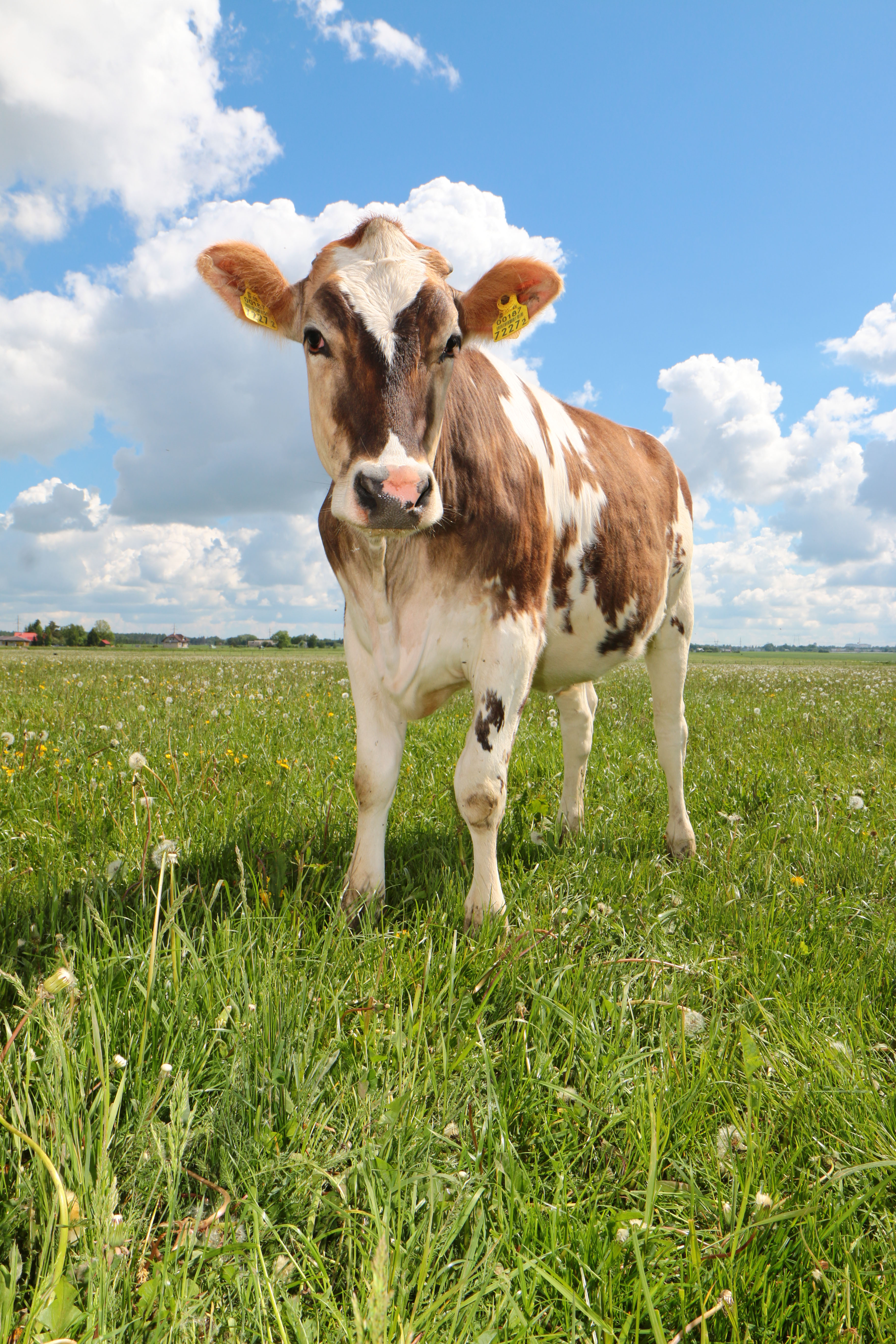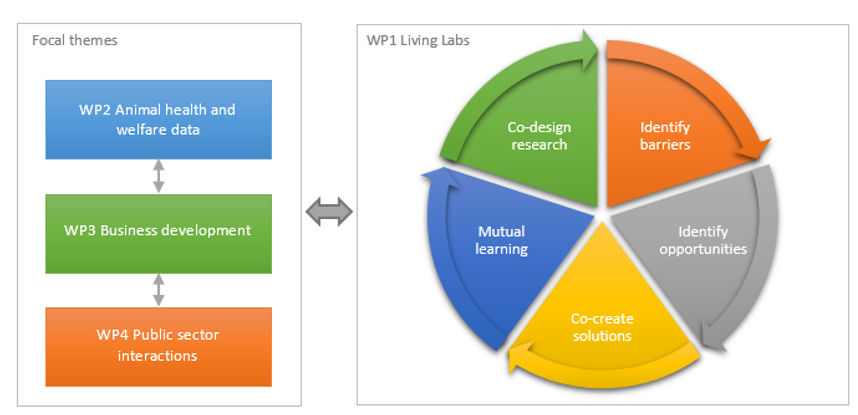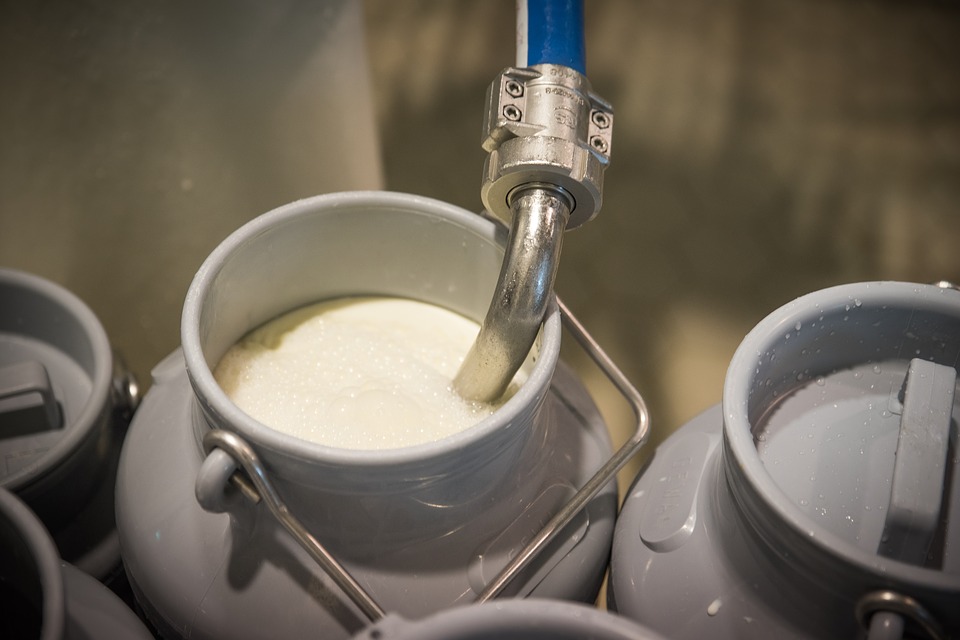
Introduction
The project SustainIT aims to identify institutional, economic and social barriers of widespread adoption of ICT in relation to animal health and welfare, and develop conceptual business models and policy recommendations for governance of innovation ecosystems to release the full potential of ICT in dairy and beef value chains.
The project uses a Living Lab approach to bring together multiple dairy and beef value chain and ICT actors such as farmers, veterinarians, processing industry, retailers, consumers, policymakers, researchers, ICT developers, technology providers and innovation brokers. The stakeholders will work together to understand the barriers and find solutions for a widespread adoption of animal health and welfare related ICT solutions. Living Labs will be established in the four participating countries: Germany, Sweden, Finland and Estonia.
Background 
Rapid development of ICT is generating large amounts of data that has potential to revolutionize the agri-food value chains and to help to address the environmental, economic and societal challenge such as greenhouse gas emissions, antimicrobial resistance and animal welfare issues and changing diets of consumers. However, the adoption of ICT solution in agri-food value chains has been hindered by issues such as the data access, data ownership and data interoperability, lack of ICT skills and suitable ready-made solutions for end-users, and inconsistent policies. This means that a better understanding on the ICT challenges and experience of different stakeholder groups is needed to in order to develop facilitate the development of supportive ICT innovation ecosystems. The Living Labs create a network for mutual learning, for sharing skills and knowledge and for co-creating new solutions that facilitate ICT adoption and valorisation of data in the value chain.
Main project activities
- Establishment of Living Labs – based on multi-actor approach, the Living Labs will engage value chains stakeholders such as farmers, veterinarians, processing industry, retailers, consumers, policy makers, researchers, ICT developers, technology providers and innovation brokers. The four Living Labs will provide the platform for addressing the ICT barriers and for co-learning process.
- Animal health and welfare data – with the input of Living Lab members, the availability of data on animal health and welfare, the data collection, data access, data needs and data exchange between supply chain stakeholders will be assessed.
- Business model development – set of activities will address consumer and societal demands and new conceptual business models. The research on the consumer data will focus on analysing the opportunities and barriers related to connecting producers with the end-consumers, and on capturing the value from the animal health and welfare data. This will be utilized in addressing the business model innovation related to ICT in agri-food chains.
- Public sector interactions –the project will study the role of public sector in pooling of the data, access to animal health and welfare data and related regulative frameworks, and contribution of public sector in development of supportive ICT innovation ecosystem.
The activities are carried through four WPs representing the four focal themes of the project (Figure 1).

Expected social impact 
The project will have direct economic and social impacts on the beef and milk value chain stakeholders by creating new knowledge and new networks, improving their skills and finding new solution allowing them to improve their ICT practices, innovate their business models and capture more value from the ICT. Dissemination of this knowledge will create wider economic, animal health and welfare related impacts to the agri-food and ICT sectors and public sector. Project will contribute to better understanding on the present situation related to animal welfare and health data. Research on business models will provide conceptual solutions for business model innovation that will utilize new data and ICT solutions. Project will help to find policy solutions to improve the data access and data use and create recommendations on public sector’s intervention for creating enabling ICT innovation ecosystem.
Implementation and plans to reach target groups
The implementation of the project builds on the multi-actor engagement throughout the project. Communication and dissemination strategy emphasize building on previous knowledge of project partners and engaged value chain stakeholders and creating new synergies and new knowledge by combining those in the Living Labs. The partners involvement in EIP-AGRI, Horizon2020 projects’ networks will facilitate the dissemination activities.
In order to maximize projects visibility and impact, detailed communication and dissemination activities have been specified for target groups such as farmers, food industry, retailers, veterinarians, ICT developers, ICT-AGRI-FOOD funding partners, public authorities and policy makers, EU authorities and programs, incl. EIP-AGRI, scientists, sectorial associations, general public. Combination of Living Labs, national and international network events will be crucial for stakeholder engagement and multiplier effects.
Consortium

Coordinated by:
Ants-Hannes Viira - Estonian University of Life Sciences, Institute of Economics and Social Sciences, Estonia
Partners:
- Vesa Virtanen - University of Oulu (UO), Kajaani University Consortium, Unit of Measurement Technology, Finland
- Henrik Barth - Halmstad University, Sweden
- Anne Põder - Estonian Dairy Cluster, Estonia
- Getachew Abate Kassa - Technical University of Munich, Germany
Funded by:
- Estonian Research Council, Estonia
- Ministry of Rural Affairs, Estonia
- Ministry of Agriculture and Forestry, Finland
- The Swedish Research Council Formas, Sweden
- Federal Ministry of Food and Agriculture, Germany
News articles
Video
Introduction
The project SustainIT aims to identify institutional, economic and social barriers of widespread adoption of ICT in relation to animal health and welfare, and develop conceptual business models and policy recommendations for governance of innovation ecosystems to release the full potential of ICT in dairy and beef value chains.
The project uses a Living Lab approach to bring together multiple dairy and beef value chain and ICT actors such as farmers, veterinarians, processing industry, retailers, consumers, policymakers, researchers, ICT developers, technology providers and innovation brokers. The stakeholders will work together to understand the barriers and find solutions for a widespread adoption of animal health and welfare related ICT solutions. Living Labs will be established in the four participating countries: Germany, Sweden, Finland and Estonia.
Background
Rapid development of ICT is generating large amounts of data that has potential to revolutionize the agri-food value chains and to help to address the environmental, economic and societal challenge such as greenhouse gas emissions, antimicrobial resistance and animal welfare issues and changing diets of consumers. However, the adoption of ICT solution in agri-food value chains has been hindered by issues such as the data access, data ownership and data interoperability, lack of ICT skills and suitable ready-made solutions for end-users, and inconsistent policies. This means that a better understanding on the ICT challenges and experience of different stakeholder groups is needed to in order to develop facilitate the development of supportive ICT innovation ecosystems. The Living Labs create a network for mutual learning, for sharing skills and knowledge and for co-creating new solutions that facilitate ICT adoption and valorisation of data in the value chain.
Main project activities
The activities are carried through four WPs representing the four focal themes of the project (Figure 1).
Expected social impact
The project will have direct economic and social impacts on the beef and milk value chain stakeholders by creating new knowledge and new networks, improving their skills and finding new solution allowing them to improve their ICT practices, innovate their business models and capture more value from the ICT. Dissemination of this knowledge will create wider economic, animal health and welfare related impacts to the agri-food and ICT sectors and public sector. Project will contribute to better understanding on the present situation related to animal welfare and health data. Research on business models will provide conceptual solutions for business model innovation that will utilize new data and ICT solutions. Project will help to find policy solutions to improve the data access and data use and create recommendations on public sector’s intervention for creating enabling ICT innovation ecosystem.
Implementation and plans to reach target groups
The implementation of the project builds on the multi-actor engagement throughout the project. Communication and dissemination strategy emphasize building on previous knowledge of project partners and engaged value chain stakeholders and creating new synergies and new knowledge by combining those in the Living Labs. The partners involvement in EIP-AGRI, Horizon2020 projects’ networks will facilitate the dissemination activities.
In order to maximize projects visibility and impact, detailed communication and dissemination activities have been specified for target groups such as farmers, food industry, retailers, veterinarians, ICT developers, ICT-AGRI-FOOD funding partners, public authorities and policy makers, EU authorities and programs, incl. EIP-AGRI, scientists, sectorial associations, general public. Combination of Living Labs, national and international network events will be crucial for stakeholder engagement and multiplier effects.
Consortium
Coordinated by:
Ants-Hannes Viira - Estonian University of Life Sciences, Institute of Economics and Social Sciences, Estonia
Partners:
Funded by:
News articles
Video